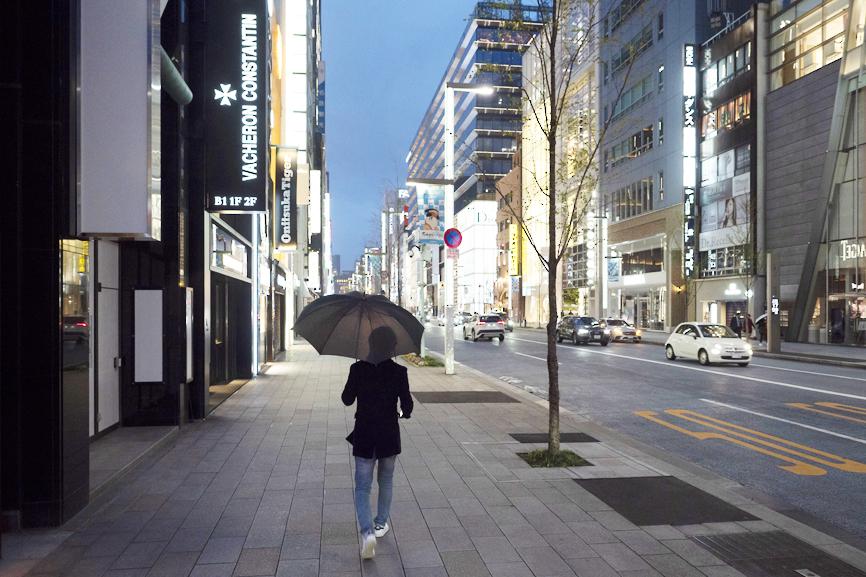Confidence among Japan’s biggest manufacturers has plunged into negative territory for the first time in seven years, a key survey showed yesterday as the COVID-19 pandemic hits demand and disrupts production.
The Bank of Japan’s Tankan business survey — a quarterly poll of about 10,000 firms — last month showed a reading of minus-8 among major manufacturers, the first negative reading since March 2013.
The short-term business sentiment survey reports the difference between the percentage of firms that are upbeat and those that see conditions as unfavorable.

Photo: AP
A negative reading means more firms are pessimistic than optimistic. It is considered to be the broadest indicator of how Japan Inc is faring.
The index for non-manufacturers fell to plus-8 from 20 in December last year survey as the virus also hit tourism, entertainment and other service industries.
The confidence index for the hotels and restaurant service industry came in at a staggering minus-59.
“Negative impacts are spreading broadly in various sectors,” NLI Research Institute senior economist Tsuyoshi Ueno said in a report ahead of the Tankan release.
They range from slower exports and the disruption of parts supply from China, to plunges in foreign visitors, cancelations of sports and other events, and weaker stock prices combined with a higher yen, he said.
The headline index was also at the lowest level since March 2013 just before the central bank embarked on unprecedented massive monetary easing in tandem with then-new Japanese Prime Minister Shinzo Abe’s pro-spending policy, known as Abenomics.
Norinchukin Research Institute chief economist Takeshi Minami said the reading was the same last month and in March 2013, but the direction was “totally different.”
“Back in March 2013, negative sentiment was receding on hopes for ‘Abenomics,’ but the situation is far more serious this time,” he said. “There are increasing risks that confidence will sink further now.”
The world’s third-largest economy is “bound to fall” into a recession, Minami said. “The problem is nobody knows how long these woes will last, hitting business confidence hard.”
Sumitomo Mitsui Trust Holdings Inc senior economist Naoya Oshikubo said that “the postponement of the Tokyo Olympics can be seen as the emblem of the great sense of uncertainty about the future, felt across Japan and the world, which is slowing demand.”
However, economists said the gloomy Tankan report is unlikely to push the Bank of Japan into taking new easing measures soon.
The bank had already brought forward its last policy meeting and decided on additional easing measures on March 16.
“It would be a different story if the yen appreciates rapidly ... but otherwise the bank is expected to maintain a wait-and-see stance for a while, given the little room it has for further easing,” Ueno said.
Japan has reported fewer infections and death than other major economies, but authorities have warned the nation is at crossroads to prevent an explosive rise in cases.

South Korea’s equity benchmark yesterday crossed a new milestone just a month after surpassing the once-unthinkable 5,000 mark as surging global memory demand powers the country’s biggest chipmakers. The KOSPI advanced as much as 2.6 percent to a record 6,123, with Samsung Electronics Co and SK Hynix Inc each gaining more than 2 percent. With the benchmark now up 45 percent this year, South Korea’s stock market capitalization has also moved past France’s, following last month’s overtaking of Germany’s. Long overlooked by foreign funds, despite being undervalued, South Korean stocks have now emerged as clear winners in the global market. The so-called “artificial intelligence

NEW IDENTITY: Known for its software, India has expanded into hardware, with its semiconductor industry growing from US$38bn in 2023 to US$45bn to US$50bn India on Saturday inaugurated its first semiconductor assembly and test facility, a milestone in the government’s push to reduce dependence on foreign chipmakers and stake a claim in a sector dominated by China. Indian Prime Minister Narendra Modi opened US firm Micron Technology Inc’s semiconductor assembly, test and packaging unit in his home state of Gujarat, hailing the “dawn of a new era” for India’s technology ambitions. “When young Indians look back in the future, they will see this decade as the turning point in our tech future,” Modi told the event, which was broadcast on his YouTube channel. The plant would convert

‘SEISMIC SHIFT’: The researcher forecast there would be about 1.1 billion mobile shipments this year, down from 1.26 billion the prior year and erasing years of gains The global smartphone market is expected to contract 12.9 percent this year due to the unprecedented memorychip shortage, marking “a crisis like no other,” researcher International Data Corp (IDC) said. The new forecast, a dramatic revision down from earlier estimates, gives the latest accounting of the ongoing memory crunch that is affecting every corner of the electronics industry. The demand for advanced memory to power artificial intelligence (AI) tasks has drained global supply until well into next year and jeopardizes the business model of many smartphone makers. IDC forecast about 1.1 billion mobile shipments this year, down from 1.26 billion the prior

People stand in a Pokemon store in Tokyo on Thursday. One of the world highest-grossing franchises is celebrated its 30th anniversary yesterday.